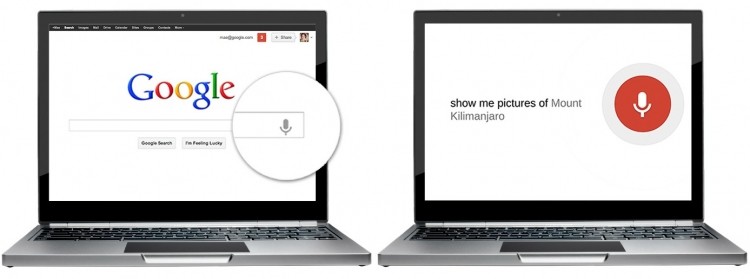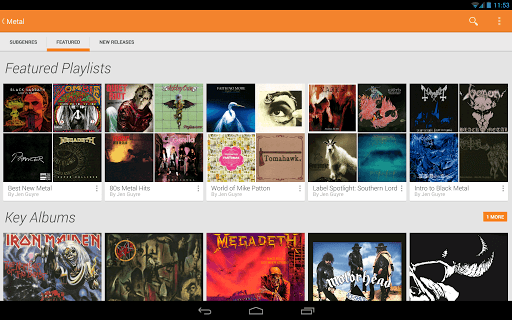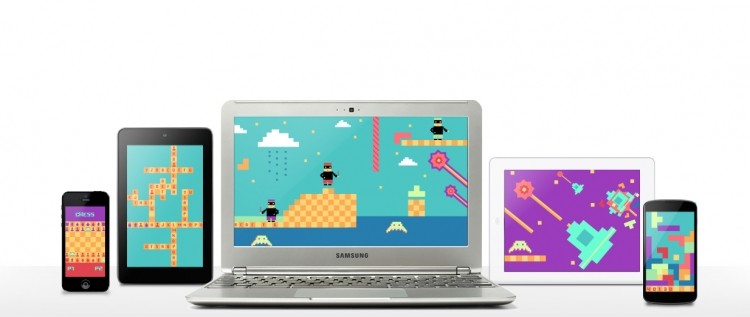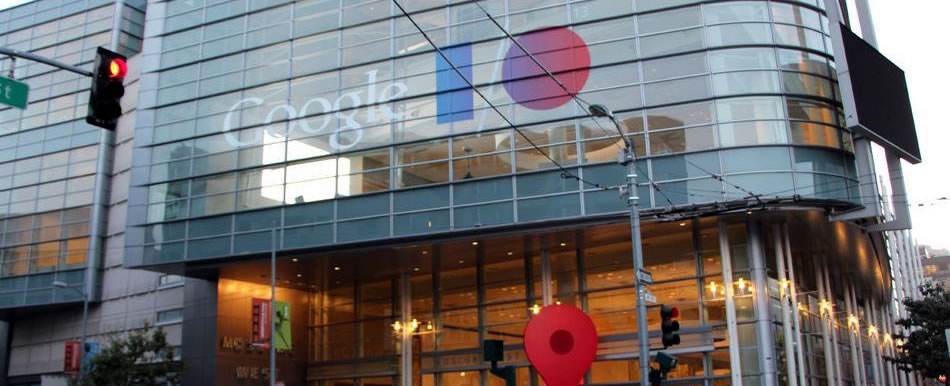Google live streamed their 3-hour I/O opening keynote today. If you couldn't tune in earlier scroll down below for a complete roundup with the most important announcements and links to in depth coverage. If you'd like to reprise the entire keynote, you can watch it here.
The new Google Maps
Google Maps has been rebuilt from the ground up. Gone is the sidebar and most of the user interface elements to make way for a beautiful edge to edge map that's tailored to your location and personal preferences. For instance, the map automatically highlights your work, home, and other places of interest based on past searches as well as GMail and Google+ user data. Everything appears in Google Now-style information cards.
The tiled bitmaps have also been replaced by vector graphics to improve overall performance. There are lots of new ground-level data, including a wholesale integration of Google Earth, with virtual tours of famous landmarks and more. Check out the video above for a complete overview of the redesigned app.
Sign up for a preview of the new Google Maps for desktop here. Android and iOS versions will come later.
Search
Continuing to build upon its "Knowledge Graph", Google says search is evolving into new experiences, which the company is cataloguing as Answer, Converse, and Anticipate. The first you're likely already familiar with – ask about the weather, sports results or a number of other things and you'll get an answer right on your device. The important news here is that new sources and languages are being added.
Moving on to converse, Google says it is working on natural language technology to let you ask questions in a conversational manner. Ask Google things like "What are my trip plans" or "photos of my trip to New Zealand" and get an answer. This already exists on iOS and Android, but now the same is coming to laptops and desktops via Chrome using "hot wording". That means you don't have to click a button, just say "okay google" and ask.

Lastly, Anticipate is essentially Google Now, which brings up information that's deemed relevant to you even before you search for it. The company is introducing a few new features though, like the ability to set voice reminders, and cards for public transit commute times, music albums, TV shows books and video games.
Google Plus Photos
Photos have always been an important part of Google+ and now the company's social network is getting better at helping you edit and store them. Free storage will be expanded from 5GB to 15GB so you can save more photos at full resolution. Since organizing, enhancing and sharing is so labor intensive Google is putting its data centers at your disposal by automating tasks such as finding duplicates, blurry or badly exposed photos.
An auto enhance button will take care of things like tonal distribution, skin softening, noise reduction, structure, white balance, and vignetting. Most impressively, it will help you pick out the best pictures based on a handful of criteria, like who's on the picture (close friends of family) and if they're smiling. You can also create animations or panoramic shots from a bunch of photos when Google detects they are part of the same series.
Hangouts
Google's heavily rumored unified messaging service was officially announced as Hangouts. The new service takes its name from one of Google Plus's most popular features and will bring Google Talk, Google Messenger, and the original Video Hangouts together into a single web and mobile app for Android and iOS.
Users will be presented with a list of recent one-to-one and group chats. You can see people's avatars as they join in and a "..." animation pop over it as they are typing. Everything – including text and images – is stored in the cloud and synched everywhere so you can go back to any point in the conversation – this can be turned off. The standout feature is group video, though. Up to ten people can join and unlike Skype it costs nothing.
Google Plus
Google's social network will debut a new design later today that does away with the long list of posts in favor of a three column-wide grid of cards – similar to Google+ on iPad and Android tablets. The site is supposed of feel more dynamic and app-like. Menus slide in and out, while clicking on a card triggers a flip animation to reveal user comments or reveal related items. On that note, Google is adding hashtags to Google+, but with a twist: image recognition and other analysis tools will automatically tag things like landmarks or sports-related posts.
Chrome
Less than five years since setting out to "make the web better" with its own browser, Google's Chrome now counts 750 million active monthly users and is available across a range of devices. The company quotes 25% and 50% performance boosts over the last year on desktop and mobile, respectively, while talking about other open and royalty-free initiatives aimed at improving images (webP) and video (VP9) on the web.
The company showed off Chrome's ability to sync devices together with a slot-car type, racing game demo where the track itself extended across five different devices – iOS included. Also, free Chromebook Pixels for Google I/O atendees... Big applause, people like expensive stuff better when it's free.
Samsung Galaxy S4 running stock Android
Anyone who's interested in the latest smartphone hardware but prefer a stock Android experience will certainly appreciate this. Google will soon begin selling an unlocked version of Samsung's flagship device, ditching TouchWiz for a "pure" Android install that's set to receive updates as soon as Google pushes them out the door. It'll also ship with an unlocked boot loader. Arriving June 26 for $649 off-contract, the device runs on both T-Mobile and AT&T's LTE networks and comes with 16GB of storage.
Google Play Music All Access
Rumors have been floating around for months and now Google has made it official. Today the company is launching its own subscription music service to take on the likes of Spotify and Rdio – all while beating Apple's rumored subscription service to the punch. The service is priced at $9.99 a month, or $7.99 if you join before June 30. There's also a 30-day free trial. Users will be able to stream "millions of songs" from Android devices or a web browser. There was no mention of which markets it will be available on but our bet is U.S. only initially.

Android Studio
Google took the wraps off an integrated development environment for building apps called Android Studio. Based on IntelliJ IDEA Community Edition, the new suite is a replacement for Eclipse and should make developers "faster and more productive." Google didn't delve into many details but mentioned things like changes to code displayed in real-time within the development console, optimization and development tips, revenue graphs, referral tracking, beta-tester control and usage metrics pulled from analytics.
Google Play game services
As rumored, Google also announced a game centric addition to Google Play services – aptly called Google Play game services. It's a full-featured gaming service akin to Game Center on iOS and Games Hub on Windows Phone that includes achievements, cloud saves, matchmaking, and leaderboards.

The key difference here is that Google Play game services is cross-platform, meaning developers can implement these features on Android games, as well as iOS and web-based games.
Google Play services
Google kicked off its conference with a round of updates to the Google Play services framework. Building upon the Google Maps API released a few weeks ago, the company is rolling out three new location centric APIs: fused location provider, geofencing, and activity. The first makes location faster to acquire while using less than 1% of battery per hour. Geofencing enables creating virtual fences around geographic areas to trigger actions when a user arrives or leaves places, and activity recognition uses accelerometer data to figure out when the user is walking, cycling, or driving. It's said to be battery efficient and works without turning on the GPS.
Other additions include expanding Google+ Sign In to a cross-platform sing-on service, and updates to Google Cloud Messaging, which lets developers easily send data between their apps and Google servers. The latter will no allow things like persistent connections between app servers and Google, and sync notifications across devices, "dismiss a notification on your handset, and it goes away on your tablet too."
What to expect? (rumors ahead of the show)
It'll be hard to top last year's skydiving stunt, and the company has already set expectations lower saying it plans to focus on software developers, not products. But we're still keeping our eyes peeled to see if some of the recent rumors pan out. Among them are a major update to Android, Google Play Games, a refreshed Nexus 7, a Google Maps redesign, a unified messaging platform, Google Glass updates and more.
